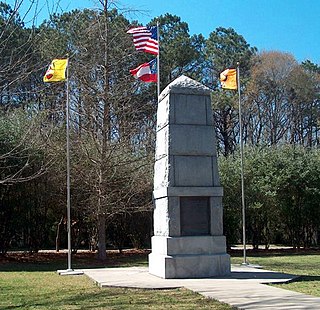
The Indian removal was the United States government's policy of ethnic cleansing through the forced displacement of self-governing tribes of American Indians from their ancestral homelands in the eastern United States to lands west of the Mississippi River—specifically, to a designated Indian Territory, which many scholars have labeled a genocide. The Indian Removal Act of 1830, the key law which authorized the removal of Native tribes, was signed into law by United States president Andrew Jackson on May 28, 1830. Although Jackson took a hard line on Indian removal, the law was primarily enforced during the Martin Van Buren administration. After the enactment of the Act, approximately 60,000 members of the Cherokee, Muscogee (Creek), Seminole, Chickasaw, and Choctaw nations were forcibly removed from their ancestral homelands, with thousands dying during the Trail of Tears.

The Trail of Tears was the forced displacement of approximately 60,000 people of the "Five Civilized Tribes" between 1830 and 1850, and the additional thousands of Native Americans and their enslaved African Americans within that were ethnically cleansed by the United States government.

The term Five Civilized Tribes was applied by the United States government in the early federal period of the history of the United States to the five major Native American nations in the Southeast: the Cherokee, Chickasaw, Choctaw, Muscogee (Creek), and Seminoles. White Americans classified them as "civilized" because they had adopted attributes of the Anglo-American culture.

The Ridge, later known as Major Ridge was a Cherokee leader, a member of the tribal council, and a lawmaker. As a warrior, he fought in the Cherokee–American wars against American frontiersmen. Later, Major Ridge led the Cherokee in alliances with General Andrew Jackson and the United States in the Creek and Seminole wars of the early 19th century.

Nanyehi, known in English as Nancy Ward, was a Beloved Woman and political leader of the Cherokee. She advocated for peaceful coexistence with European Americans and, late in life, spoke out for Cherokee retention of tribal hunting lands. She is credited with the introduction of dairy products to the Cherokee economy.

Wesley Studi is a Native American actor and film producer. He has garnered critical acclaim and awards throughout his career, particularly for his portrayal of Native Americans in film. In 2019, he received an Academy Honorary Award, becoming the first Native American as well as the first Indigenous person from North America to be honored by the academy.

(Helen) Diane Glancy is an American poet, author, and playwright.
The Trail of Tears: Cherokee Legacy is a 2006 documentary by Rich-Heape Films. It presents the history of the forcible removal and relocation of Cherokee people from southeastern states of the United States to territories west of the Mississippi River, particularly to the Indian Territory in the future Oklahoma.
Walela is a trio of singers, named for the Cherokee word for hummingbird. The group was founded in 1996 by sisters Rita Coolidge and Priscilla Coolidge, with Priscilla's daughter Laura Satterfield as the third member.
Joseph Erb is a Native American computer animator, educator, and artist and a member of the Cherokee Nation.
Sharon Irla is a Cherokee artist, enrolled in the Cherokee Nation. A self-taught artist, Irla began entering competitive art shows in 2003. Her collective body of works span the fields of painting, murals, graphics, photography, and custom picture frames with Southeastern Woodlands / Mississippian motifs. The majority of her awarded works are oil-on-canvas portraits of Cherokee women in both contemporary and historical settings.
The Cherokee removal, part of the Indian removal, refers to the forced displacement of an estimated 15,500 Cherokees and 1,500 African-American slaves from the U.S. states of Georgia, North Carolina, Tennessee and Alabama to the West according to the terms of the 1835 Treaty of New Echota. It is estimated that 3,500 Cherokees and African-American slaves died en route.
Dana Tiger is a Muscogee artist of Seminole and Cherokee descent from Oklahoma. Her artwork focuses on portrayals of strong women. She uses art as a medium for activism and raising awareness. Tiger was inducted into the Oklahoma Women's Hall of Fame in 2001.
Robert Taylor is an American self-taught artist from Oklahoma whose paintings explore Native American subject matter. He uses symbolism and manipulates figures' proportions, particularly hands and feet.
Rachel Caroline Eaton was believed to be the first Native American woman from Oklahoma to be awarded a Ph.D.
Maggie Axe Wachacha (1892–1993) was renowned for reinvigorating Cherokee culture and for her work in ethnobotany.
Jeanne Rorex-Bridges is painter and illustrator based in Oklahoma. She is a member of the Echota Cherokee Tribe of Alabama, a state-recognized tribe.
Mary Adair is a Cherokee Nation educator and painter based in Oklahoma.

Cara Cowan Watts is a Cherokee Nation politician. She served on the Cherokee Nation Tribal Council from 2003 to 2015 and was a candidate for Principal Chief of the Cherokee Nation in the 2023 Cherokee Nation principal chief election.







